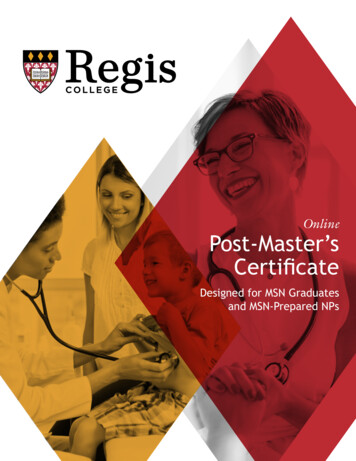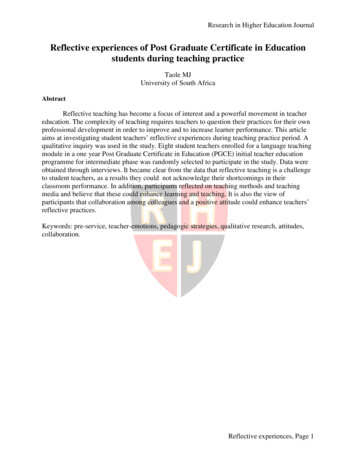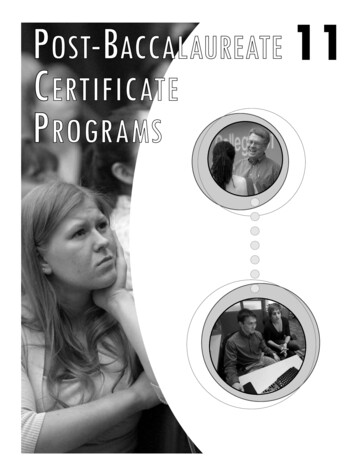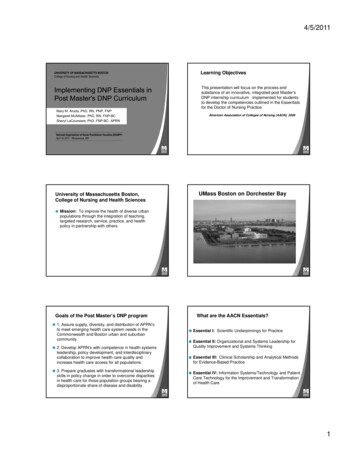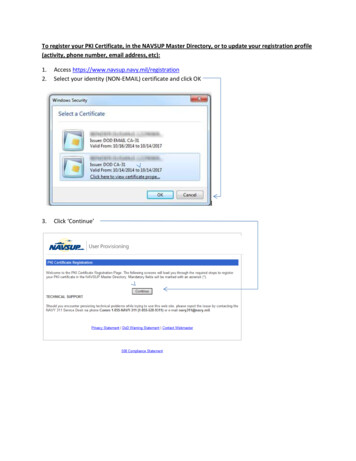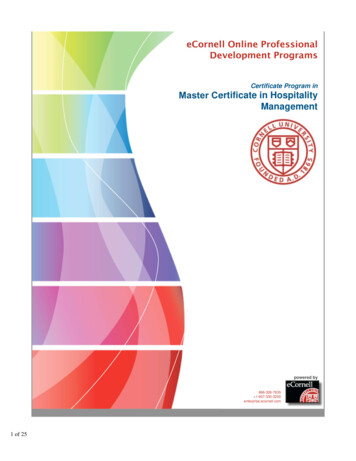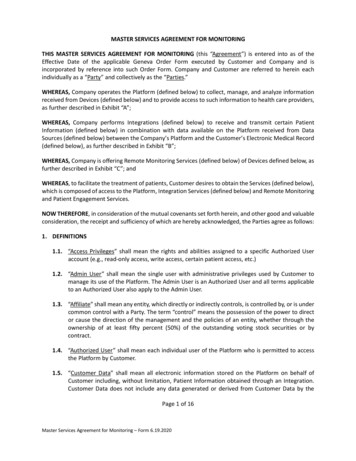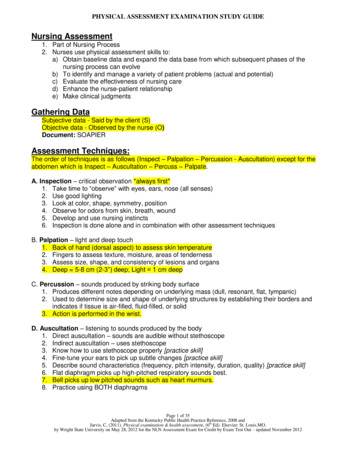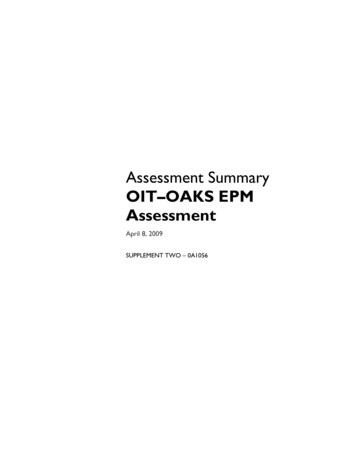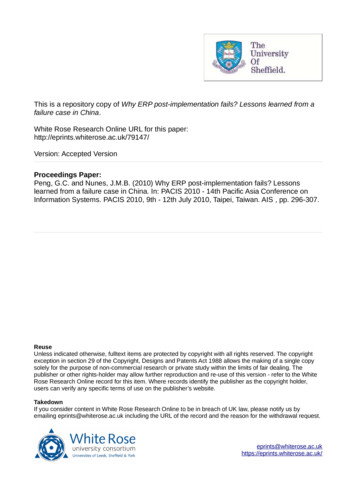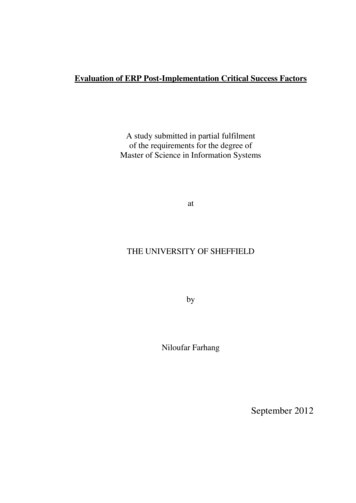
Transcription
Certificate Assessment Plan:Post-Master'sPsychiatric/Mental HealthNurse PractitionerUniversity of FloridaCollege of NursingM. Dee Williams, PhD, RNwillimd@ufl.edu1Certificate Assessment Plan
Table of ContentsA.Rationale . 3B.Mission . 3C.Student Learning Outcomes (SLOs) . 3D. Assessment Timeline for Certificates . 4E.Assessment Cycle Chart for Certificates . 4F.Methods and Procedures. 5G.Assessment Oversight . 52Certificate Assessment Plan
Post-Master's Psychiatric/Mental Health NursePractitionerCollege of Nursing2012-13 Certificate Assessment PlanA. RationaleThe Post-Master's Certificate for advanced practice nursing in the area of psychiatric/mental healthis for the student who has already earned a Master's Degree in Nursing and would like to pursuecertification as an advanced practice nurse with the psychiatric/mental health focus. A GraduateCouncil approved concentration already exists in this area for a MSN degree. The differencebetween the concentration and the proposed professional certificate is that students in thecertificate program have already earned a Master's Degree in Nursing.B. MissionThis certificate aligns with the College Vision Statement which includes “preparing nurses forleadership as clinicians who improve the health of individuals, families, and communities.” Itsupports the University Mission which includes the education of “students so they are prepared tomake significant contributions” that “address the needs of our societies.” In keeping with the goalsof The Florida Board of Governors Strategic Plan, this program address critical healthcareworkforce needs for Florida.C. Student Learning Outcomes (SLOs)Knowledge:1. A graduate with a Post-Master's Certificate will demonstrate a comprehensive, in-depthknowledge base for lifelong learning and professional development.Skills:2. A graduate with a Post-Master's Certificate will demonstrate clinical competence as an advancedpractice nurse in the focus area of study.Professional Behavior:3. A graduate with a Post-Master's Certificate demonstrates competence in professional behavioras an advanced practice nurse in the focus area of study.3Certificate Assessment Plan
D. Assessment Timeline for CertificatesPost-Master's Psychiatric/Mental Health Nurse PractitionerSLOsCollege of NursingAssessment 1Pass-rates on national certification examination 80% annually.Satisfactory ratings on clinical course evaluations completed by facultysupervisors per semester (see attached example clinical evaluation tool).Satisfactory ratings on clinical course evaluations completed by facultysupervisors per semester (see attached example clinical evaluation tool).#1#2#3E. Assessment Cycle Chart for CertificatesPost-Master's Psychiatric/MentalHealth Nurse PractitionerAnalysis and Interpretation:Improvement Actions:Dissemination:#1#2#3Certificate Assessment PlanSLO #1 after completion of program; SLO #2 & SLO#3 at the end of each semester of enrollment inclinical courses.SLO #1 within 6 months of program completion;SLO #2 & SLO #3 at the end of the semesterfollowing completion of each clinical course.SLO #1 within 2 years of completion of program;SLO #2 & SLO #3 within 1 year of completion ofprogram.Year 12-13SLOs4College of NursingXX13-14XXX14-15XXX15-16XXX
F. Methods and ProceduresSLO #1: Graduates sit for the national certification examination starting 1 month – 6 weeks afterprogram completion. Results are received and analyzed by June each year for previous calendaryear graduates. (e.g. December 2013 graduates will take the exam starting in January/February2014 and results will be analyzed by June 2014.) The College Academic Affairs Committeerecommends programmatic changes to the College faculty, as appropriate, for implementation inspring term of the following year.SLO #2 and SLO #3: Clinical course evaluation tools are used to evaluate student achievement ofclinical competencies and competence in professional behavior at the end of each semester inwhich students are enrolled in clinical courses. Results for each cohort are analyzed during thefollowing semester. Course faculty members consider changes in teaching methods, learningactivities, and/or evaluation methods. Recommendations for improvements that require changesin course syllabi are made to the College Academic Affairs Committee and are approved by theCollege faculty prior to the semester in which the course is taught in the following year.G. Assessment OversightNameM. Dee WilliamsKathleen Ann Long5Department AffiliationCollege of NursingCollege of NursingCertificate Assessment PlanEmail Addresswillimd@ufl.edulongka@ufl.eduPhone Number325-273-6335352-273-6324
Clinical Evaluation FormStudentUniversity of FloridaFacultyCollege of NursingPreceptorPsychiatric-Mental Health Clinical Specialist/NurseSemesterPractitioner TrackNGR 6500C: Individual Therapy for Psychiatric-Mental Health Nursing with AdultsEvaluation:A student must receive a rating of satisfactory performance in each of the categories by completion of the semester in order to receive apassing grade for the course(s). A rating of less than satisfactory in any of the categories will constitute an unsatisfactory grade.ProgressionDate:Initial:Program Objective:Areas of Evaluation:Develop an ethical framework to guide one’s advanced nursing roleand foster one’s leadership and continued growth within the nursingprofession.Demonstrates knowledge of role of advanced practice psychiatric-mental health nursein health care delivery system through collaboration and referral.Course Objectives:Analyze advanced nursing practice roles in the treatment of psychiatricmental health adult clients, including past, present, and future patternsand trends.Develop a professional role as an advanced practice psychiatric-mentalhealth nurse, including the integration of self-knowledge.Demonstrates advanced practice role behaviors, including:Sets role appropriate boundariesEstablishes rapport with clientDevelops therapeutic verbal and nonverbal communication skillsProgram Objectives:4. Critically and accurately assess, plan, intervene, andUtilizes the nursing process in the assessment and treatment of individualsAssesses clients accurately6Certificate Assessment PlanFinalDate:Initial:SUSU
1.evaluate health experiences (including wellness andillness) of individuals, families, and communities.Utilize theories from nursing sciences and arts to develop acomprehensive and holistic approach to nursing care.Course Objectives:3. Utilize selected theories, including interpersonal andcommunication theories, to promote therapeutic relationswith adult clients receiving mental health care.Implement individual therapy with adult clientsexperiencing psychiatric problems, including assessment, planning,intervention, evaluation, and promotion of mental health.Program Objective:7Certificate Assessment PlanDemonstrates therapeutic interviewing skillsDemonstrates competency in assessment techniquesCollects relevant and complete objective and subjective data from client and other relevantsourcesData on all body systemsData on nutritionData on culture, environment, and socioeconomic statusData on spiritualityData on psychological functioning (mental status examination)Demonstrates beginning competency in individual and family assessment techniquesincluding use of genogramsAnalyzes dataInterprets laboratory data accuratelyDevelops differential diagnosesDevelops prioritiesRelates assessment findings to pathophysiologial changesConsiders client as a system and as a subsystem of a familysystem, social system, and environmental systemAreas of Evaluation:Organizes data using a variety of classification systems including nursing, DSM-IV-TR,SUSU
and ICD-9Plans care appropriate for client status, diagnoses, socioeconomic and cultural status, andenvironmentIncludes health promotion activitiesIncludes nutritionBases care on theoretical frameworkIntervenes therapeutically using effective communication skillsAdapts interventions to client’s customs, beliefs and resourcesDetermines pharmacologic and non-pharmacologic therapiesSuggests psychotropic medications appropriatelyMonitors client responses to psychotropic medicationsEvaluates client response to interventionsRevises plan appropriatelyCompetes discharge summary or clinical evaluation summarywhen appropriateProgram Objective:1. Utilize theories from nursing sciences and arts to develop acomprehensive and holistic approach to nursing care.Course Objective:Utilize selected theories, including interpersonal and communicationtheories, to promote therapeutic relations with adult clients receivingmental health care.8Certificate Assessment PlanTheory/Knowledge BaseUses theoretical framework as basis for organization of nursing practiceUtilizes current knowledge of acute and chronic psychiatric disorders in assessment andplanApplies knowledge from a variety of individual therapiesApplies knowledge of general systems theoryApplies knowledge of anatomy and physiology especially related to human brainApplies knowledge of physical and psychological growth and development
Program Objective:Utilize communication and interpersonal skills to facilitate collaborativerelationships with clients and the health care team.Course Objective:Collaborate with adult clients and health care providers to provide holisticnursing care to individuals from diverse populations, especially ruralpopulations.Program Objective:7. Utilize communication and interpersonal skills to facilitate9Certificate Assessment PlanCollaboration with Interdisciplinary TeamUses interpersonal skills to collaborate with an interdisciplinary teamEvaluates achievement of health care goals with health care teamConsults with and refers to health team members and other resourcesIncludes client in development of care planActs as client advocateCollaborates with other health care providersCommunicationUses technology and informaticsModifies communication for diverse populationsWrites/Dictates notes that are concise, organized and articulateCommunicates when appropriate with political entities to inform them of the impact onclients of policies effecting psychiatric-mental health careUses non-judgmental and accurate terminologyObtains informed consent when appropriateAreas of Evaluation:Collaboration with Interdisciplinary TeamSUSU
collaborative relationships with clients and the health careteam.Course Objective:Collaborate with adult clients and health care providers to provide holisticnursing care to individuals from diverse populations, especially ruralpopulations.Uses interpersonal skills to collaborate with an interdisciplinary teamEvaluates achievement of health care goals with health care teamConsults with and refers to health team members and other resourcesIncludes client in development of care planActs as client advocateCollaborates with other health care providersCommunicationUses technology and informaticsModifies communication for diverse populationsWrites/Dictates notes that are concise, organized and articulateCommunicates when appropriate with political entities to inform them of the impact onclients of policies effecting psychiatric-mental health careUses non-judgmental and accurate terminologyObtains informed consent when appropriateProgram Objective:2. Critique and apply research findings to provide quality health care,initiate change and improve nursing practice.Course Objective:Critique and utilize current research related to mental health andpsychiatric disorders, and propose future research needs and directions.10Certificate Assessment PlanProvides scientific rationale to support clinical reasoning andmanagement planEvaluates implications of research to client situationsProposes research directions to answer clinical questions in psychiatric-mental healthnursing and as basis for change
Program Objective:Utilize theories and principles of health care policy,organization and finance to manage fiscal, human, and physical resources.Apply knowledge of cultural diversity and global perspectives indelivering health care.Course Objective:Apply the knowledge of political, legal, economic, social, cultural, andtechnological factors in delivering mental health care to adult clients.Program Objective:Utilize legal and ethical principles to guide decision-making in anadvanced practice role.Course Objective:Evaluate and incorporate ethical and legal decisions in the developmentof an advanced practice role in psychiatric-mental health nursing.CommentsDates of observed clinical ficate Assessment PlanAreas of Evaluation:Plans care based on client’s socioeconomic resources (considers cost and availability oftreatment interventions).Plans care based on client’s culture.Considers impact of health care policies on treatment.Intervenes in political system appropriately, i.e., contacts legislators about impact ofproposed policiesConsiders cost of treatment and makes recommendations for increasing cost effectivenessof careUses epidemiological, social and environmental data when drawing conclusions andplanning carePerforms risk assessment on clientsClinical ReasoningIdentifies therapeutic options for individualsPrioritizes interventions among treatment optionsClarifies decisions as independent or collaborativeGenerates timeline for client’s responseConducts risk-benefit analysis of treatment planPractices Within an Advanced Practice RoleUses time effectivelyModels self-directed learningValidates practice with clients and health care providersProfessional in appearanceArticulates values of an advanced practice psychiatric-mental health clinicalspecialist/nurse practitionerBases practice on ethical theories/frameworkEvaluates clinical decisions based on ethical and legal guidelinesPractices within legal scope of practiceEvaluates impact of personal beliefs and experiences on care provided to clientPractice StandardsCompares quality indicators with patient outcomesEvaluates cost of treatment/management plan including resourcesExamines feasibility of patient complianceSUSU
Revised:Approved:12KLG 5/06/02Academic Affairs: 1/02Certificate Assessment Plan
The Post-Master's Certificate for advanced practice nursing in the area of psychiatric/mental health is for the student who has already earned a Master's Degree in Nursing and would like to pursue certification as an advanced practice nurse with the p
